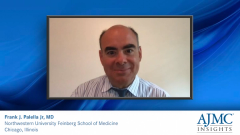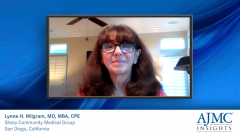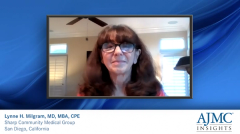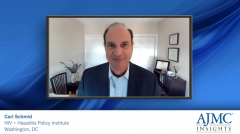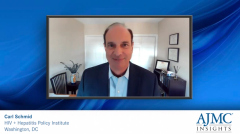
Common Barriers to PrEP Therapy
Carl Schmid, an HIV/PrEP advocate, provides an overview of PrEP therapy; Frank J. Palella Jr, MD, a clinician focused on HIV and infectious disease, delves into the diagnostic process.
Episodes in this series

Carl Schmid: It's a real shame that not enough people are taking PrEP [preexposure prophylaxis] that should be. The CDC [Center for Diseases Control] indicates probably 1.2 million people are eligible to take PrEP, and only around 28% of those people eligible are currently taking it. There's a number of reasons why. One, people don't know about it. It's still relatively new. In the communities that we need to reach—particularly black gay men, Latino gay men, black women—they're not aware of it. It's also a burden. You have to take a drug every day for a disease [when] you're not sick. That's changed. Some of the pills could be large, and that could be an issue. There are smaller pills right now, but you have to take the drug every day. It's not just taking the pill. You have to be tested periodically for HIV. You have to make sure that you're not living with HIV, and you have to go to the clinic or the doctor periodically for a certain test as well. It is a commitment, and there are a lot of hurdles. People may think that there's a cost associated with it and too many steps and prior authorizations that people have to go through. We need to make it easier for people, and there are new PrEP modalities right now, long acting that may be helpful. Another reason is a lot of providers are not talking to their patients about the potential for PrEP and the importance of preventing HIV. There's still a lot of stigma, particularly in the south. To talk about PrEP, you have to talk about issues, such as sex. You have to talk about, in many cases, homosexuality and other things that may put people at risk of HIV, such as sharing needles. [Many] providers aren't comfortable talking about some of these issues. Those are some of the barriers to people accessing PrEP right now and why the numbers aren't as high, but we need additional community outreach, provider outreach, and [to] make it easier for people to access PrEP.
Frank J. Palella Jr, MD: Baseline assessments for people being considered for PrEP initiation include a number of factors. First and foremost, are they HIV uninfected? [Ascertaining] an HIV-uninfected status needs to include assessment of serology, including HIV antibody and antigen testing, and by current guidelines should also include a viral load test for persons who might be recently infected. There are other things that we check though as well. We use it as an opportunity for sexually transmitted infections that are common and even more easily transmissible than HIV, including syphilis, gonorrhea, and chlamydia. We want to make sure that the individual has a well-functioning liver. We check comprehensive metabolic panel, but other than laboratory screening, we need to assess whether the patient is ready to adhere to a regimen, either [a] daily pill or showing up every couple of months for an intermuscular injection. That includes consideration of other social determinants of health. These include things like access to care, housing stability, mental health, recreational substances, competing risks for maybe not getting to a clinic if it's for injections or for needing to hide and non-disclose their own diagnosis. Now, presuming that we can get through that part of it and our patient buys into and appreciates the need and indication for pre-exposure prophylaxis prevention of HIV. At follow-up visits, we always screen for HIV, do a complete review of activity—meaning, asking the patient to disclose what they've done, check for adverse events or interim issues with the medication or with the whole notion of PrEP, and do sort of a psychosocial check-in as well.
This transcript has been edited for clarity.
Newsletter
Stay ahead of policy, cost, and value—subscribe to AJMC for expert insights at the intersection of clinical care and health economics.
